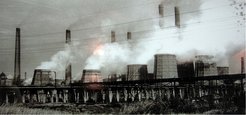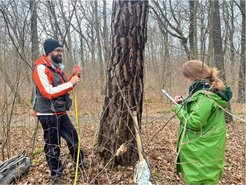Historical insights from tree rings into pollution in eastern Germany

This project focuses on investigating historical pollution levels in eastern Germany through the analysis of growth rings of living trees, which serve as records for understanding environmental changes over time. Dendrochronology allows researchers to construct a chronological archive of a tree's growth; each annual ring symbolizes a year and reflects the environmental conditions experienced by the tree, including climate variations and anthropogenic influences like industrial pollution. In urban areas, the legacy of industrialization has significantly impacted the environment, resulting in elevated levels of heavy metals in soil and foliage. This contamination has lasting implications for the health and dynamics of forest ecosystems, making it important to assess how these historical pollution levels have influenced tree growth.

To achieve these objectives, we are working closely with Friedrich Schiller Universität, Jena, to employ advanced dendrochronological techniques alongside cutting-edge analytical methods, such as micro-X-ray fluorescence (µXRF). This non-destructive method enables the precise measurement of heavy metal concentrations, particularly lead (Pb), that have accumulated in the tree rings over the decades. By carefully collecting and preparing wood core samples from selected trees, we can analyze how historical industrial activities have influenced both tree growth and forest health. The data generated from this analysis will facilitate correlations between the levels of pollution and industrial activity, shedding light on the long-term consequences of human intervention in these ecosystems.
The research outcomes are expected to produce a comprehensive dataset that details the intricate relationships between tree growth patterns, environmental variability, and human-induced disturbances. These findings will enhance our understanding of how pollution has evolved in eastern Germany while providing vital insights to inform current environmental policies and conservation efforts. This project is closely aligned with the core theme of "Land Use Change and Regenerative Practices" at the Max Planck Institute of Geoanthropology, emphasizing the need for long-term ecological monitoring in urban forestry to create sustainable management practices.













